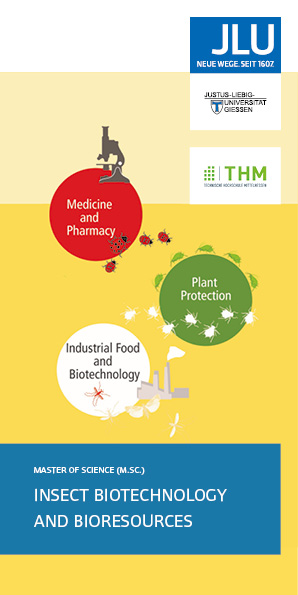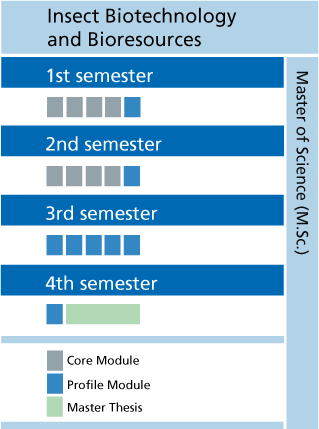Insect Biotechnology and Bioresources (MSc)
Taught in English
Overview
- IBB - Bildseite
-

- Overview-rest
-
With more than a million scientifically described species, insects form the largest group of organisms on earth. As an emerging interdisciplinary research area, insect biotechnology explores insects as well as insect-associated micro- and macroorganisms as newly emerging bioresources for medicine, plant protection, pharmacy, industrial food and biotechnology.
During your studies you will work intensively on the systematics and ecology of insects, acquire specific scientific and technical knowledge and learn about various methodical research approaches in order to investigate insects and their associated organisms as a new resource for food and luxury food, enzymes and bioactive natural products and finally to refine fully-developed products.
The study programme stands out with its strong emphasis on research and practical relevance and as well as with a high level of interdisciplinary approaches and projects.
Composition of the Study Programme
- Composition of the Study Programme
-
Degree

Master of Science (MSc)
Duration of studies
4 semesters – 120 credit points (cp)
Composition of degree programme
The study programme is organized in modules. Each module comprises four semester hours per week and is completed with a final examination as given in the module description. The final grade of the study programme is calculated from the achieved module grades.
The course consists of 8 mandatory modules (core modules) and 8 optional modules (profile modules) and the master thesis. The concept of choosing individually profile modules enables a diverse range of study focuses on the basis of a fundamental scientific education (core modules).
Core Modules
- Bioprocess Engineering I (6 CP)
- Biostatistics and Experimental Design (6 CP)
- Entomology I (6 CP)
- Entomology II (6 CP)
- Food Technology (6 CP)
- Integrated Pest Management (6 CP)
- Natural Product Discovery Platforms (6 CP)
- Natural Product Chemistry (6 CP)
Profile Modules
Students tailor their individual profile by selecting 8 modules from the entire profile module catalogue of the faculty. Selection of recommended English modules for this study program:
- Antibiotics: present, past, and future
- Bioinformatics
- Bioprocess Engineering II – Advanced
- Insect Biotechnology
- Insects for food and feed production systems
- Instrumental, biochemical and trace analytical methods in food analysis
- Laboratory Course I
- Laboratory Course II
- Method development in food analysis and food biotechnology
- Milestones of Insect Biotechnology & Bioresources
- Molecular Techniques
- Pharmaceutical Basics
- Selected Chapters of Pharmaceutical & Industrial Biotechnology
- Trends and Advances in Natural Product Research
- Quality Management
Master's Thesis (24 CP)
The major part of the 4th semester is dedicated to writing the master’s thesis. With the thesis students proof their capability to independently research a given topic scientifically within a limited period.
Application
- Application: Commencement of studies
-
Commencement of studies
Only possible in the winter semester;
- Bewerbergruppen-engl
-
Application
Application Procedure
Depending on where you obtained either your university entrance certificate or your Bachelor degree, we differentiate two application procedures:
Case A
You need to use JLU’s application portal if
- you hold a completed Bachelor’s degree obtained at a German university (the country of origin of your university entrance certificate is of no importance).
- your JLU Bachelor programme is not yet complete. Please provide a preliminary report. The country of origin of your university entrance certificate is of no importance.
- you obtained your university entrance certificate in Germany and attended a Bachelor programme at a German university other than JLU. Please provide a preliminary report if your programme is not yet completed.
- you want to change to another degree programme at JLU. The country of origin of your university entrance certificate is of no importance.
Case B
You need to submit your application to uni-assist if
- you hold a completed Bachelor’s degree obtained at a foreign university (the country of origin of your university entrance certificate is of no importance).
- you obtained your university entrance certificate abroad and attended but not completed yet a Bachelor programme at a German university other than JLU or at any other university within EU. Please provide a preliminary report.
- Application: deadline, intake capacity, fees
-
Intake capacity ("Numerus Clausus")
The intake capacity of this degree programme is not limited internally by the university.
Deadline
Application for enrolment starts June. Please note that the application via uni-assist opens in May.
Application deadline: June 15Fees
No study fees are charged for this study program. However, students have to pay a semester contribution of approx. 300 EUR for administration and semester tickets (details).
- Application: Entrance requirements
-
Admission Requirements
Applicants must hold a Bachelor's degree with at least 180 ECTS-points in one of the following scientific fields:
- Agricultural Sciences
- Biology
- Biotechnology
- Chemistry
- Food Chemistry
Other Bachelor's degrees can be accepted as an equivalent degree by the board of examiners.
The application includes a letter of motivation with 500 words (+/- 10%) outlining the candidate’s personal motivation and his or her subject-specific knowledge.
Applications will be examined individually as to whether the study requirements are fulfilled. A specialist commission at JLU will then finally decide on the admission. The criteria for the evaluation of the motivation letter are given in the examination regulations. We cannot provide information on the status of acceptance before the application process is fully completed.
- Application: Language requirements
-
Language Requirements
As the entire degree course is taught in English, applicants must provide proof of sufficient knowledge of written and spoken English. Accepted proofs of language proficiency:
- either: TOEFL-Test ITB (internet-based test) with at least 95 points or IELTS-Test with at least grade of 7 in the academic test;
- or: Proof of obtaining a local higher education entrance qualification in one of the following countries: Australia, Ireland, Canada, New Zealand, USA, United Kingdom, South Africa;
- or: Proof of a Bachelor’s degree in English in one of the following countries: Australia, Ireland, Canada, New Zealand, USA, United Kingdom, South Africa;
- or: Proof of the UNIcert III certificate.
- Further information-admission international
-
For further information please contact:
Registrar’s Office / Studierendensekretariat
Goethestrasse 58
Postal address: Postfach 11 14 40, 35359 Giessen
Tel.: 0641/99-16400
international.admission@admin.uni-giessen.de / stud-sekretariat@admin.uni-giessen.de
Career Options
Contact
- Contact: Study Advisor
-
Subject Advisor
- PD Dr. Thomas Degenkolb
Institut für Insektenbiotechnologie
Heinrich-Buff-Ring 26-32
35392 Gießen
Phone: +49 (0) 641 - 99 37651
Consultation hours: by appointment
E-Mail: thomas.degenkolb
- PD Dr. Thomas Degenkolb
- Contact: Central Study Advisor (JLU)
-
Central Study Advisor (JLU)
